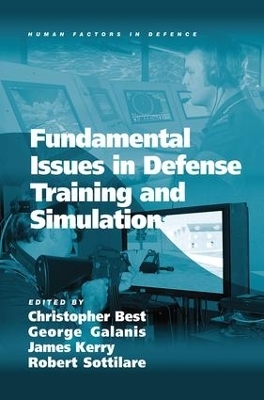
Fundamental Issues in Defense Training and Simulation
CRC Press (Verlag)
978-1-138-07435-4 (ISBN)
Dr Christopher Best is a Senior Research Scientist within the Air Operations Division of the Defence Science and Technology Organisation, Australia. He holds a PhD in psychology and his research interests include various aspects of human perception, cognition and learning. He currently leads a program of research on team performance and the use of simulation for training in the domain of military air operations. Dr Best has been an Australian national representative on the TTCP HUM Group Technical Panel on training since 2004. Dr George Galanis is currently the Scientific Advisor for the Australian Air Force. Prior to that position he was a Principal Research Scientist with the Defence Science and Technology Organisation in Australia. He has worked extensively in the field of simulation and training, including developing simulators for civil and military pilot training, and from 2001 until 2012 he was head of training research for the Australian Army. He was the Australian National Leader of the TTCP HUM TP2 Training Technology panel from 2001 until 2012 and chaired the panel from 2006 until 2009. Dr Galanis holds a PhD in Engineering and Human Factors and he is also a qualified pilot holding an Air Transport Pilot License with multi-engine instrument and instructor ratings. James Kerry is a Research Leader in the New Zealand Defence Technology Agency. He has considerable experience in the UK Armed Forces and more recently the NZ Defence Force and is currently involved exploring the effective transfer of training from the classroom to the 'field'. Kerry is the National Lead and former Chair of the TTCP HUM Group Technical Panel on training technology. Dr Robert Sottilare is the Chief Technology Officer at the US Army Research Laboratory’s SFC Paul Ray Smith Simulation & Training Technology Center, Orlando, Florida. He holds a PhD in Modeling & Simulation and his current research focus is in machine learning, learner modeling and the application of artificial i
List of Figures, List of Tables, List of Contributors, Acknowledgments, 1 Introduction, Part I Analysis, Part II Design, Part III Technologies, Index
| Erscheinungsdatum | 01.07.2017 |
|---|---|
| Reihe/Serie | Human Factors in Defence |
| Verlagsort | London |
| Sprache | englisch |
| Maße | 156 x 234 mm |
| Gewicht | 521 g |
| Themenwelt | Kunst / Musik / Theater ► Design / Innenarchitektur / Mode |
| Informatik ► Software Entwicklung ► User Interfaces (HCI) | |
| Technik ► Umwelttechnik / Biotechnologie | |
| Wirtschaft | |
| ISBN-10 | 1-138-07435-7 / 1138074357 |
| ISBN-13 | 978-1-138-07435-4 / 9781138074354 |
| Zustand | Neuware |
| Haben Sie eine Frage zum Produkt? |
aus dem Bereich


